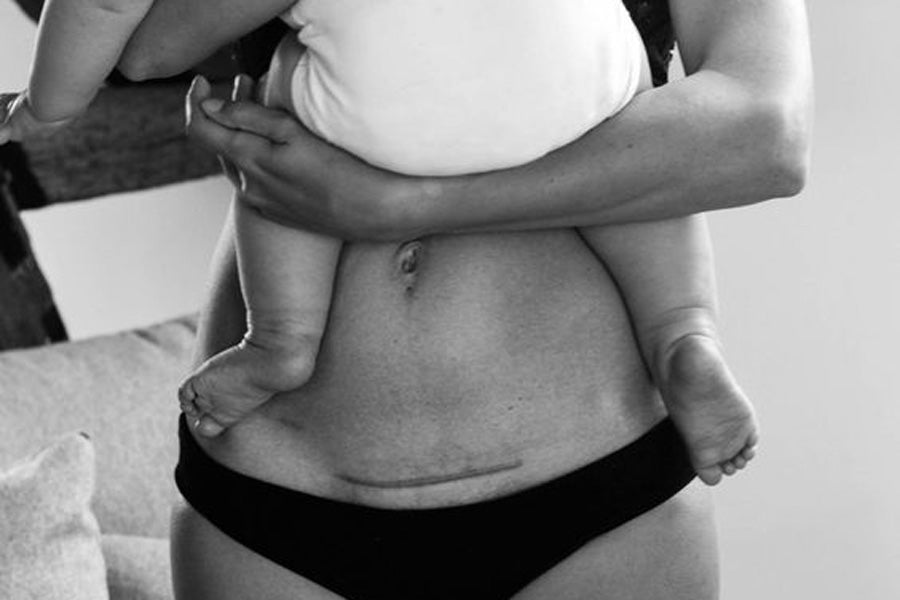- Delivery by cesarean section, an intervention not always planned
- How does a cesarean delivery take place?
- What are the consequences of childbirth after a cesarean?
Delivery by cesarean section, an intervention not always planned
Caesarean section remains a relatively common method of delivery since in France, each year, nearly one in five mothers give birth to their child in this way.
A cesarean section can be planned for a long time, from the start of your pregnancy or decided a few weeks before the term if the doctor who is treating you considers it necessary. Certain factors in particular may naturally require the use of a cesarean section (placenta previa, blocking the baby's exit, a uterine malformation, an infection in the mother, etc.).
Other reasons may tip the scales in favor of a cesarean section: a heavy baby, a twin or multiple pregnancy, a mother-to-be with a history of cesarean delivery or a baby who is in the breech position. However, even in these cases, cesarean sections are not systematic and some pregnant women will be able to give birth vaginally. Caesarean sections remain a medical procedure with anesthesia, which carries risks of complications, for both the mother and the child. The decision will therefore be made according to your situation, with your midwife or your obstetrician-gynecologist, to best preserve your health and that of your baby!
In other cases, and this can be quite confusing for the mother-to-be, the cesarean section is decided urgently, during childbirth if the latter presents poorly and involves too many risks. This is the case in 60% of cesarean sections. Reasons that may warrant an immediate C-section include: ineffective contractions that no longer dilate the cervix, a baby in pain after a long labor, or an umbilical cord position around the baby's neck. The birth must then take place quickly for the health of both of you (or sooner if you are expecting several babies).
How does a cesarean delivery take place?
As part of a planned cesarean section, you will be given an appointment around the 38th or 39th week of amenorrhea, i.e. two to three weeks before your due date. Depending on the scheduled intervention time, you will have to come to the maternity ward the same morning, or the day before.
After the usual examinations (monitoring, urine test, even ultrasound to check the baby's position), you will take a shower with disinfectant soaps and put on a charlotte and nightgown.
Then head to the operating room, where your partner may or may not be present during the cesarean section, to support and reassure you if necessary. More and more establishments accept the presence of the co-parent, in certain circumstances. If this is not the case, rest assured: he or she will be able to join you just after birth to meet baby and share his or her first hours of life.
It is time to proceed with anesthesia, and again, the solution best suited to your case will be offered to you. This is generally a classic epidural, or spinal anesthesia. The latter works on the same principle as the epidural, but will numb your entire lower body. It only requires one dose, and you will therefore not have a catheter to reinject product during the operation.
In the case of an emergency cesarean section, the health professional following you may choose general anesthesia, but always as a last resort. At the same time, you will be fitted with a urinary catheter to facilitate the surgical procedure.
Then place the application of an antiseptic and disinfectant solution on your entire stomach, then the installation of sterile fields, these pieces of tissue which will be placed just in front of your stomach. You will no longer see what is happening, but rest assured, the anesthesiologist and very often a midwife will stay by your side to make sure everything is okay. <3
Everything then happens in a few minutes: the surgeon makes an incision in the skin and the uterus just above the pubic bone, about ten centimeters, extracts the baby and cuts the umbilical cord. A midwife takes care of the baby's first aid while the surgeon removes the placenta and places staples to close the tissues. Your cesarean scar will be protected by a bandage for the first few days.
You will then be able to discover baby and share this special moment with your other half. It may happen, rarely, that the meeting cannot take place right away. In this case, try to keep in mind that you have your whole life to discover yourself...

What are the consequences of childbirth after a cesarean?
As with any operation, cesarean section requires specific monitoring. First, you will keep the urinary catheter for an additional 24 hours, as well as an infusion to easily administer painkillers. You will need to be a little patient: you will not be able to get up and leave your bed for a few hours after the operation, which is completely normal. Your body needs to recover little by little, take the opportunity to rest and take some (well-deserved) time for yourself. The transit will resume two to three days after delivery, and will be accompanied by the start of bleeding, which will last for 3 to 4 weeks. Blood loss is generally greater after a cesarean section than after a vaginal birth.
Hospitalization will also be a little longer : you will be able to leave the maternity ward with your child generally after five to seven days. A midwife will then remove the threads and staples and give you all the advice on how to take care of your scar. When it is properly closed, you can massage it to soften and soften it with our Baume Onctueux which works wonders to repair the skin after pregnancy!


- Regular price
-
35,90 € - Regular price
-
- Sale price
-
35,90 €
Returning to sport will be possible after a few months, when your scar no longer pulls you. Even if you did not give birth vaginally, it is recommended to carry out proper perineal rehabilitation, because this muscle still supported the baby's weight for 9 months and can be distended.
After a C-section, give yourself some time to rest well. To avoid worsening the pain, it is important not to force yourself and not to carry heavy loads for a while. Don't hesitate to get help on a daily basis, in your life as a young mother to take care of your baby and recover your tone and a healthy body as quickly as possible! Your partner will certainly be of great help to you. Don't forget that you have done the majority of the work so far, don't have any qualms about putting him or her to work, it's for a good cause ! :)
Photo credit: @parents_fr and @simplementclaire (Pinterest)








